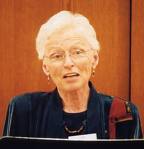Who Said That?
 Sunday, September 21, 2008 at 10:15PM
Sunday, September 21, 2008 at 10:15PM  On why the doctrine of God underlying the "Hallelujah Chorus" (in Handel's Messiah) is a such a "dangerous one"
On why the doctrine of God underlying the "Hallelujah Chorus" (in Handel's Messiah) is a such a "dangerous one"
"It creates feelings of awe in the hearts of loyal subjects and thus supports the `godness' of God, but these feelings are balanced by others of abject fear and humiliation: in this picture, God can be God only if we are nothing. The understanding of salvation that accompanies this view is sacrificial substitutionary atonement, and in Anselm's classic rendition of it the sovereign imagery predominates. Since even a wink of the eye by a vassal against the Leige Lord of the universe would be irremediable sin, we as abject subjects must rely totally upon our sovereign God who "became man" in order to undergo a sacrificial death, substituting his great worth for our worthlessness. . . .It inspires strong emotions of awe, gratitude, and trust toward God and, in ourselves, engenders a satisfying swing from abject guilt to joyous relief. Its very power is part of its danger, and any picture which seeks to replace it must reckon with its attraction."
OK . . . Who said that? Please no google searches or cheating. The whole point is to guess!
 Kim Riddlebarger
Kim Riddlebarger
 This rant against "Monarchialism" comes from feminist theologian Sallie McFague's book Models of God (Fortress, 1987), 64-65.
This rant against "Monarchialism" comes from feminist theologian Sallie McFague's book Models of God (Fortress, 1987), 64-65.
It amazes me how far these "cutting edge" theologians will go to escape the clear teaching of Scripture, reflected in Handel's Messiah.


Reader Comments (24)
Bishop Spong
(if you know who the "theologian" is the above statements gain relevance)
I am going to guess that it is from someone in the emerging Church movement or from one of the theologians they draw from like Stanley Grenz. They are constantly making reference to Anselm and the substitutionary atonement in a negative way. That is why many of them prefer the moral influence theory of the atonement. It is another form of "Christless Christianity" which Michael Horton has been making us aware of in recent years.
Theologians play into the hands of the atheists when they make remarks like this. Reformational theology with a sound rational apologetic is the only antidote and defense against this type of rising theological tide.
Tony Jones who is considered one of the leading lights of the emerging movement may have said this too.
And Mr. Yeazel you're right about Nietzsche, he had a better grasp on the Gospel and what it means for both theology and practical Christian life than most of today's Christians have. In fact, he's the only writer in the atheist/agnostic side of things I've ever come across who has any real intellectual depth (including Bertrand Russell). If Christians can understand and respond effectively to his arguments, the modern atheists (Hitchins, Dawkins, Harris, etc) lose a lot of their force.
The answer to the previous "Who Said That?" is almost always posted when I add a new one--that is a one week period.
And a good thing, it seems.